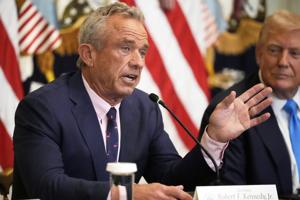AI Sentiment: Cautiously Bullish
Reason: Kennedy's $500 million funding for vaccine development indicates potential innovation, despite controversy, reflecting growing interest in diverse vaccine approaches.
Robert F. Kennedy Jr. has taken a significant step in his pursuit of vaccine development by pulling in a remarkable $500 million in funding. This funding is aimed at advancing the production of vaccines that align with Kennedy's vision and goals. His initiative highlights a growing trend in the intersection of vaccine development and private investment, as more individuals and organizations seek to influence the health landscape.
The decision to secure such substantial financial backing underscores Kennedy's commitment to his cause, which has been a point of contention within the medical community. His controversial views on vaccines have garnered both support and criticism, reflecting the polarized opinions surrounding vaccination. This funding aims not only to support research but also to advocate for alternatives in the field of immunization.
The influx of capital will be utilized to develop vaccines that Kennedy believes are safer and more effective, a claim that has sparked debate among health professionals. As the world grapples with ongoing health challenges, the importance of informed discussions about vaccines is paramount. Kennedy's approach aims to address public concerns and skepticism regarding traditional vaccine protocols.
Furthermore, this funding could pave the way for innovative research methodologies and partnerships with various stakeholders in the healthcare sector. It is indicative of a broader movement towards exploring different avenues within healthcare and public health, prompting questions about the future of vaccine research and its implications for global health.
As this initiative progresses, it will be essential to monitor how these developments influence the ongoing dialogue about vaccination and public health policy. The implications of this funding extend beyond financial support; they challenge the conventional narratives that have long dominated the medical community. Kennedy's efforts may indeed reshape perceptions and practices related to vaccines in the years to come.




